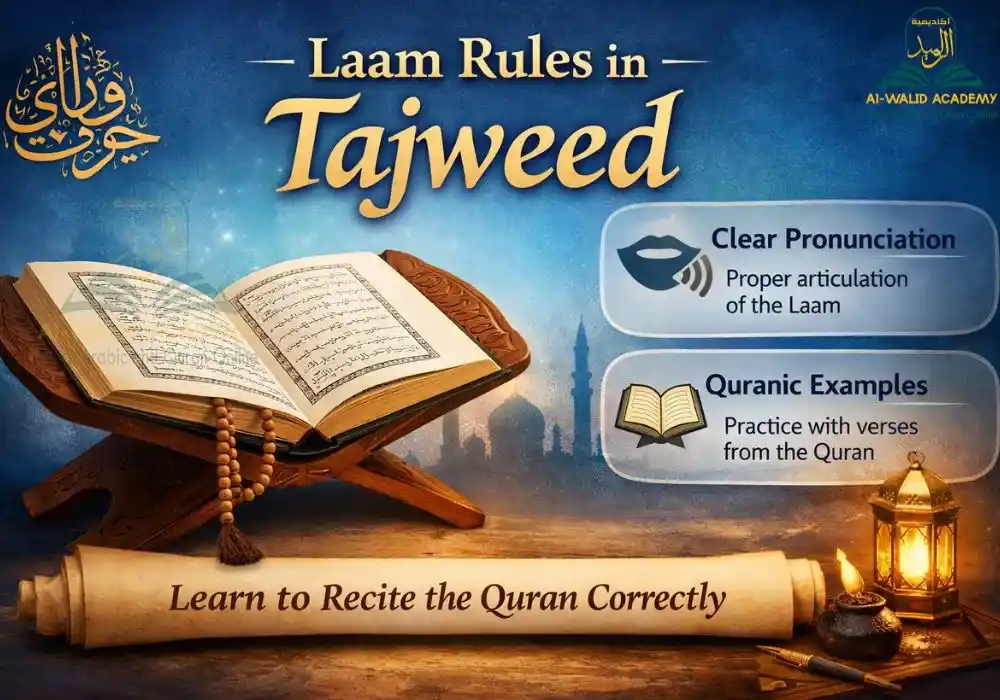Learning Quranic Arabic is a vital step for those seeking to deeply understand the Quran. Unlike modern Arabic, Quranic Arabic requires a focus on vocabulary, grammar, and context specific to the Quran. In this article, we’ll explore how to learn Quranic Arabic language, and its importance, and answer some common questions about learning this sacred language.
What Is the Importance of Quranic Arabic?

Quranic Arabic holds a unique place in Islamic tradition and learning. It is the language through which the Quran was revealed to Prophet Muhammad (PBUH), making it the divine language chosen by Allah to communicate His final message to humanity. Understanding the Quran in its original language offers a more profound and accurate comprehension than relying solely on translations, no matter how precise they are.
Deeper Connection with the Quran:
Learning Quranic Arabic allows you to engage with the words of the Quran as they were intended. Translations, while helpful, often fail to convey the depth, beauty, and intricacies of the Arabic language. The words of the Quran have specific meanings, connotations, and grammatical structures that can be lost in translation.
Appreciating the Linguistic Miracle:
The Quran is not just a religious text; it is also a linguistic masterpiece. Its eloquence, rhyme, and structure are considered miracles by scholars of the Arabic language. By studying Quranic Arabic, you gain access to this miraculous nature, helping you to see how the Quran’s language supports its message. Many rhetorical devices used in the Quran cannot be fully appreciated unless one understands Quranic Arabic.
Enhanced Spiritual Experience:
When you read the Quran in its original Arabic, the experience becomes more spiritual. The recitation and pronunciation of Quranic verses in Arabic have a rhythm and flow that enhances the emotional and spiritual connection between the reciter and the text. This experience is often diminished when the Quran is read in translation.
Uncovering Hidden Meanings:
Quranic Arabic is rich with layers of meaning. A single verse in the Quran can have multiple interpretations, each revealing a different aspect of divine wisdom. When you understand Quranic Arabic, you can access these layers of meaning, which are often obscured in translation.
Better Understanding of Islamic Law and Ethics:
Many principles of Islamic law (Shariah) and ethics are derived directly from the Quran. Understanding Quranic Arabic is crucial for scholars and students who wish to delve deeper into Islamic jurisprudence (Fiqh) and theology. It helps in correctly interpreting the laws and commandments mentioned in the Quran.
Is Quranic Arabic Different from Normal Arabic?

Yes, Quranic Arabic is distinct from both Modern Standard Arabic (MSA) and the various regional dialects spoken across the Arab world. This distinction is crucial for learners who seek to understand the Quran in its original form. Let’s break down the key differences:
1-Historical Context: Quranic Arabic, often referred to as Classical Arabic, is rooted in the 7th-century Arabian Peninsula, where the Quran was revealed. At that time, the Arabic language was at its peak in terms of linguistic richness and complexity. The vocabulary, grammar, and sentence structures found in the Quran reflect this classical form, which is less commonly used in modern communication.
2-Vocabulary: Quranic Arabic contains many words and expressions that are either no longer used in Modern Standard Arabic or have evolved to take on different meanings. For example, certain words in the Quran might have connotations or subtleties that aren’t present in their modern counterparts. Learning these words is essential for a deeper understanding of the Quran’s message.
3-Grammar and Syntax: The grammatical structures in Quranic Arabic can differ significantly from those found in Modern Standard Arabic. Classical Arabic employs more complex sentence formations, and the rules of I’rab (grammatical inflection) are more detailed and intricate. These structures are essential in conveying the Quran’s deeper meanings and ensuring correct interpretation.
4-Poetic Nature: The Quran’s language is highly poetic and rhythmic. Its verses were meant to be recited aloud, and its structure reflects this, with balanced phrases and a natural flow. This feature is not as prominent in Modern Standard Arabic, which is more straightforward and used in formal writing and speech.
5-Not Used in Daily Conversations: Unlike Modern Standard Arabic, which is used in news, formal speeches, and written texts, Quranic Arabic is not used in everyday conversations or regional dialects. This can pose a challenge for learners who are familiar with one form of Arabic but not the other. However, mastering Quranic Arabic is essential for those who want to deeply connect with the Quran’s message.
At Al-Walid Academy, we recognize the challenges that come with learning Quranic Arabic, especially if you’re already familiar with Modern Standard Arabic or a dialect. Our Quranic Arabic Course is designed to bridge this gap, focusing on the unique vocabulary and grammatical structures of the Quran, while our Modern Standard Arabic Online Course provides learners with the tools they need for broader communication in the Arab world.
- Our Arabic Language Courses offer a strong foundation in both Modern Standard Arabic and Quranic Arabic, ensuring you’re well-equipped for both everyday conversations and your Quranic studies.
Read Also: How Do Native Arabic Speakers Learn MSA
Can I Learn Quranic Arabic by Myself?
While it is possible to self-learn Quranic Arabic, it is highly recommended to seek guidance from knowledgeable teachers. Self-learning might lead to misinterpretations, especially when trying to understand intricate linguistic structures. Structured courses, like those at Al-Walid Academy, can significantly accelerate your learning and ensure you understand the language correctly.
We also offer Quran Memorizing Courses to complement your language learning journey, ensuring you can both recite and understand the Quran.
How to Learn Quranic Arabic Language Effectively?

Mastering Quranic Arabic is a journey that requires dedication, patience, and the right approach. Many learners are often unsure where to begin, but with a structured plan and effective methods, you can quickly progress and deepen your understanding of the Quran’s language. Here’s how you can effectively learn Quranic Arabic:
1. Start with Essential Vocabulary
One of the most effective ways to begin your Quranic Arabic learning journey is by focusing on the vocabulary frequently found in the Quran. Words like “Rahman” (The Merciful), “Allah” (God), and “Malik” (King) appear often, and learning their meanings and uses will give you a solid foundation.
2. Master Quranic Grammar
Quranic Arabic has a unique grammatical structure that sets it apart from modern Arabic. Focusing on grammar, particularly the rules related to I’rab (grammatical inflection), verb conjugations, and sentence structure, is key to fully grasping the meaning of Quranic verses. Unlike Modern Standard Arabic, which simplifies some grammar rules, Quranic Arabic maintains the original complexities that give deeper layers of meaning to the text.
Our Arabic Foundation Course at Al-Walid Academy provides a comprehensive guide to understanding Quranic grammar, offering you the tools you need to read the Quran with confidence.
3. Consistent Practice and Recitation
Consistency is the cornerstone of learning Quranic Arabic effectively. Daily practice is essential, whether through reading, writing, or reciting Quranic verses. By regularly engaging with the Quran, you reinforce your learning and improve your fluency over time.
In addition to reading, listening to Quranic recitations can significantly enhance your pronunciation and comprehension. Try to imitate the recitations of skilled Qaris (reciters) to perfect your Tajweed and pronunciation of Quranic Arabic. At Al-Walid Academy, our Tajweed Course teaches you how to recite with proper articulation, ensuring that you recite the Quran as it was revealed.
4. Learn Through Immersion
One of the best ways to learn Quranic Arabic is by immersing yourself in the language as much as possible. This can include watching videos, listening to Quranic lectures, and using Arabic in your daily life. Immersing yourself in both the language and the culture surrounding the Quran will accelerate your learning and deepen your understanding.
For those who prefer a structured approach, Al-Walid Academy offers comprehensive programs, including Quranic Arabic Courses and Arabic Conversation Classes, where learners practice in a fully immersive environment under the guidance of experienced instructors.
5. Utilize Digital Tools and Resources
The internet is a treasure trove of resources for learning Quranic Arabic. From online dictionaries to apps that help you memorize verses, there are many tools that can complement your learning. Flashcards, interactive quizzes, and audio resources can make your study more engaging and help you retain information more effectively.
At Al-Walid Academy, we blend traditional methods with modern technology. We offer Quran Classes for Adults and Quran Lessons for Kids Online that incorporate interactive elements to make learning more dynamic and effective.
6. Join a Structured Course
While self-study is an option, enrolling in a structured course with professional guidance can fast-track your progress. Learning Quranic Arabic requires more than just memorizing words or grammar; it requires understanding the deeper meanings behind the verses. Instructors can provide personalized feedback, correct mistakes, and offer insights that you might miss when studying alone.
Read about: Is Arabic a hard language to learn
Is It Possible to Learn Quranic Arabic Quickly?
The pace at which you learn depends on the time and effort you put in. However, with dedicated study and proper instruction, you can reach a functional understanding in a matter of months. Online resources, structured courses, and consistent practice all contribute to accelerated learning.
With our Online Noorani Qaida Course, you can quickly build the foundational skills needed for reading and understanding the Quran.
Most Common Quranic Arabic Words
|
Arabic Word (الكلمة) |
Meaning (المعنى) |
Explanation (الوصف الكامل) |
|
الله (Allah) |
God |
The central word of the Quran, referring to the one true God in Islam, who is the creator of the universe and all that exists. Understanding this word is fundamental to the Islamic faith. |
|
رَحْمَٰن (Rahman) |
The Most Merciful |
One of the 99 names of Allah, signifying His boundless mercy towards all His creations. This attribute is frequently mentioned in the Quran to highlight Allah’s compassion. |
|
مَلِك (Malik) |
King or Sovereign |
Refers to Allah as the ruler and sovereign of all existence. Understanding this word emphasizes Allah’s ultimate authority and control over the universe. |
|
جنة (Jannah) |
Paradise |
The ultimate reward for the righteous, a place of eternal bliss and happiness in the afterlife, as frequently mentioned in the Quran. Knowing this term motivates believers towards righteous living. |
|
نار (Nar) |
Hellfire |
The place of punishment for wrongdoers in the afterlife. It represents the consequences of disobedience to Allah’s commandments. Mastering this word helps in understanding the balance of reward and punishment in Islamic teachings. |
|
إيمان (Iman) |
Faith |
Represents belief in Allah, His angels, His books, His messengers, and the Last Day. Understanding “Iman” is crucial as it forms the foundation of a Muslim’s belief system. |
|
كافر (Kafir) |
Disbeliever |
Refers to someone who rejects faith in Allah and His revelations. This term is important for understanding Quranic discussions around belief, disbelief, and consequences. |
|
حَقّ (Haq) |
Truth |
A frequently occurring word in the Quran, referring to the absolute truth. It is central to understanding divine justice and the ultimate reality of life, often mentioned in relation to fairness and morality. |
|
صلاة (Salat) |
Prayer |
The formal act of worship that is performed five times a day by Muslims. “Salat” is a critical word, emphasizing the importance of maintaining a spiritual connection with Allah. |
|
زكاة (Zakat) |
Charity |
The obligatory charitable giving that purifies wealth and aids the needy. Zakat is one of the five pillars of Islam and is essential to understanding social justice in Islam. |
Why Mastering These Words Is Key
Focusing on these commonly used Quranic words is an efficient way to accelerate your learning. By understanding the core vocabulary, you will:
- Comprehend verses faster: Since these words are repeated throughout the Quran, recognizing them will allow you to grasp the meaning of entire passages with more ease.
- Build context: Once you are familiar with these words, you can start to understand their context in various verses, which will deepen your overall comprehension.
- Enhance your spiritual connection: By learning these frequently used words, you’ll not only understand the Quran on a linguistic level but also connect with its spiritual and ethical messages.
- Read More about Arabic Words with Deep Meaning
If I Learn Arabic Will I Understand the Quran?
Learning Arabic alone might not guarantee a full understanding of the Quran. Quranic Arabic includes specific contexts and interpretations that require focused study. Alongside language learning, engaging in Tafseer (interpretation) is crucial for deeper comprehension.
Our Tajweed Course is designed to help you perfect your pronunciation, while our Quran Tafseer Online provides insights into the meanings behind the verses, ensuring a comprehensive understanding.
Where Can I Learn Quranic Arabic for Free? Join Al-Walid Academy and Get a Free Trial!

There are numerous free resources available online, but not all of them provide the structure and expertise needed for deep learning. At Al-Walid Academy, we offer a free trial for our Quranic Arabic Courses, allowing you to experience the quality of our teaching before committing. Our experienced instructors will guide you through every step, ensuring your success in learning Quranic Arabic.
Read Also: the Best Place to Learn Arabic Online
Common Quranic Arabic Verbs Used in the Quran
Verbs form the backbone of understanding any language, and in Quranic Arabic, they are essential for grasping the meaning and context of the verses. Verbs convey actions, commands, and states of being, allowing us to see how the Quran communicates its divine message. By learning and mastering some of the most commonly used verbs in the Quran, you can significantly enhance your comprehension and connection with the sacred text.
Here’s a breakdown of the most important Quranic Arabic verbs and their significance:
1. علا (Ala) – To Rise or Ascend
This verb appears in contexts that refer to rising above or ascending in both physical and metaphorical senses. In the Quran, it is used





